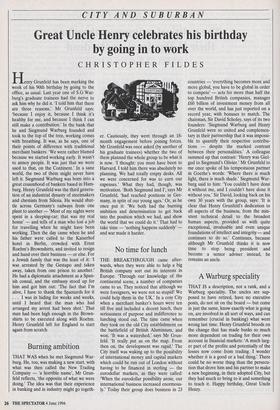CITY AND SUBURBAN
Great Uncle Henry celebrates his birthday by going in to work
CHRISTOPHER FILDES
Henry Grunfeld has been marking the week of his 90th birthday by going to the office, as usual. Last year one of S.G.War- burg's graduate trainees had the nerve to ask him why he did it. `I told him that there are three reasons,' Mr Grunfeld says: `because I enjoy it, because I think it's healthy for me, and because I think I can still make a contribution.' In the bank that he and Siegmund Warburg founded and took to the top of the tree, working comes with breathing. It was, as he says, one of their points of difference with traditional merchant bankers: 'We were rather blamed because we started working early. It wasn't to annoy people. It was just that we were used to that, on the Continent.' In a sane world, the two of them might never have left it. Siegmund Warburg was born into a great cousinhood of bankers based in Ham- burg. Henry Grunfeld was the third genera- tion of an industrial dynasty of steelmakers and chemists from Silesia. He would shut- tle across Germany's railways from one plant to another — 'Most of my nights were spent in a sleeping-car; that was my real home' — and tells of a man who lost a job for travelling when he might have been working. Then the day came when he and his father were called to the Kaiserhof hotel in Berlin, crowded with Ernst Roehm's Brownshirts, and invited to resign and hand over their business — or else. For a Jewish family that was the least of it: 'I was arrested by the Gestapo and taken away, taken from one prison to another.' He had a diplomatic attachment as a Span- ish consul, and the embassy stood up for him and got him out: 'The fact that I'm alive, I have to thank the Spaniards for it . . . I was in hiding for weeks and weeks, until I heard that the man who had arranged my arrest had been shot.' That man had been high enough in the Brown- shirts to be executed along with Roehm. Henry Grunfeld left for England to start again from scratch.


























































 Previous page
Previous page